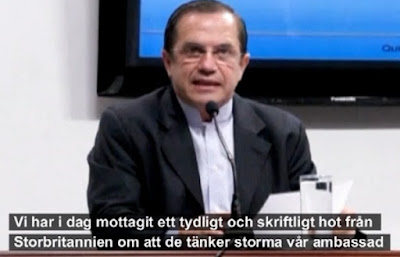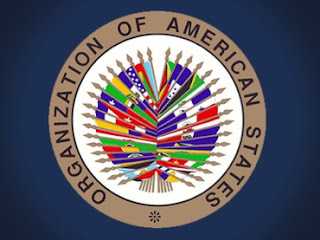En polisman avslöjade av misstag en hemlig plan där Assange skall gripas
under "alla omständigheter" om han går utanför Ecuadors ambassad.
------------------------------------------------------------------------------------------------------------------------------
under "alla omständigheter" om han går utanför Ecuadors ambassad.
------------------------------------------------------------------------------------------------------------------------------
UK: - Fuck the
international community
The Telegraph/RT 2012-08-25
Polisen i Storbritannien har fått klartecken från regeringen att bryta mot internationella överenskommelser i jakten på Assange.
Vienna Convention on Diplomatic Relations från 1961 och Vienna Convention on Consular Relations från 1963, respekteras av de flesta civiliserade länder. Storbritannien har tydligen ambitioner att tillhöra en annan kategori.
Polisens order är att Assange skall gripas så fort han sätter foten utanför ambassaden oavsett om han befinner sig i ett fordon som har diplomatisk immunitet, på samma sätt som en ambassad.
Ordern för Assanges gripande gäller också att han skall gripas "till varje kostnad" oavsett om hans liv riskeras eller inte. (En budgetversion på "dead or alive"?)
---------------------------------------------------------------------------------------------------------------------------------
"Brief – EQ. (Polisens order enligt läckt dokument)
Embassy Brief Summary of current position Re: Assange.
Action required Assange to be arrested under all circumstances.
He comes out with dip immune [diplomatic immunity] as dip bag in dip bag in dip vehicle ARRESTED.
Discuss possibilities of distraction SS10 to liaise…provide additional support," the visible portion of the “restricted” official document reads.
-------------------------------------------------------------------------------------------------------------------------------
---OAS Press Release August 24, 2012---
RESOLUTION OF THE TWENTY-SEVENTH MEETING OF CONSULTATION OF MINISTERS OF FOREIGN AFFAIRS (Official version)
August 24, 2012
(Approved at the plenary meeting held on August 24, 2012 and
pending revision by the Style Committee)
pending revision by the Style Committee)
THE MEETING OF CONSULTATION OF MINISTERS OF FOREIGN AFFAIRS,
BEARING IN MIND that in resolution CP/RES. 1005 (1863/12), of the Permanent Council of the Organization, dated August 17, 2012, a Meeting of Consultation of Ministers of Foreign Affairs was convened “to address the situation between Ecuador and the United Kingdom of Great Britain and Northern Ireland regarding the inviolability of the diplomatic premises of Ecuador in the United Kingdom of Great Britain and Northern Ireland in accordance with international law” and “to agree on appropriate measures to be adopted”;
CONSIDERING:
That the American states have reaffirmed in the Charter of the Organization of American States that “international law is the standard of conduct of States in their reciprocal relations” (Article 3.a);
That strict compliance is, therefore, essential on the part of all states with the standards that govern the protection of, respect for, and inviolability of the premises of diplomatic missions and consular offices, which standards have been codified in the Vienna Convention on Diplomatic Relations of April 18, 1961, in particular, the provisions contained in Article 22 of that treaty; and in the Vienna Convention on Consular Relations of April 24, 1963, particularly the provisions at Article 31 of that treaty;
That the Government of the Republic of Ecuador publicly announced that on August 15, 2012, it received from the United Kingdom of Great Britain and Northern Ireland an aide-memoire which states, inter alia, “… that there are legal grounds in the United Kingdom--the Diplomatic and Consular Premises Act of 1987--that would allow us to take steps to arrest Mr. Assange on the Embassy’s current premises”; and
That the Government of the Republic of Ecuador, on August 16, 2012, announced its decision to grant political asylum to Mr. Julian Assange, who requested it on June 19, 2012, at the Embassy of Ecuador in London,
RESOLVES:
1. To reiterate the full validity of the principles and standards that govern diplomatic relations among states, especially those that concern full respect for the inviolability of the premises of diplomatic missions and consular offices, as recognized in the 1961 Vienna Convention on Diplomatic Relations and the 1963 Vienna Convention on Consular Relations.
2. To reaffirm that those principles and standards constitute fundamental rules for ensuring the peaceful coexistence of all the countries that comprise the international community.
3. To reiterate the full validity of the principles enshrined in international law, such as respect for sovereignty, faithful compliance with international treaties, peaceful settlement of disputes, peaceful coexistence among states, and rejection of the threat or use of force to settle disputes.
4. To reject any attempt that might put at risk the inviolability of the premises of diplomatic missions, to reiterate the obligation / of all states not to invoke provisions of their domestic law to justify noncompliance with their international obligations, and, in this context, to express its solidarity and support for the Government of the Republic of Ecuador.
5 To urge the Governments of Ecuador and the United Kingdom of Great Britain and Northern Ireland to continue to engage in dialogue in order to settle their current differences in accordance with international law, taking into account the statements made recently by authorities of both governments.
6. To entrust the Permanent Council with the due follow-up of this matter.
Reference: E-67
-----------------------------------------------------------------------------------------------------------------------------
Sweden's statement for the
OAS Meeting of Foreign Ministers
Ministry for Foreign Affairs
Published 24 August 2012
Check against delivery.
Statement by Sweden at the Organization of American States, OAS, Meeting of Consultation of Ministers of Foreign Affairs on the Situation between Ecuador and the United Kingdom, Washington 24 August 2012.
The statement was delivered by Karin Höglund, Deputy Chief of Mission at the Swedish Embassy in Washington.
Mr Chairman, Secretary General, Ministers, Representatives, Observers
Thank you for offering me the opportunity to address this assembly today.
First of all, I would like to thank the UK for clarifying important legal points, and thereby correcting the misunderstandings that have been circulating recently, not least in the media.
Allow me to clarify, and in some parts reiterate, the state of Swedish law in this case.
State of the law
The issue at hand is exclusively a question of surrender to Sweden under a European arrest warrant on Mr Assange, who is under criminal investigation in Sweden suspected of sexual offences against two Swedish women.
I would like to stress that no request for Mr Assange's extradition to a third country has been issued. The question of extradition to a third country is hypothetical speculation that shifts the focus away from what this case is actually about, which is that Mr Assange is suspected of sexual offences in Sweden. Swedish prosecution proceedings must be allowed to take their course, not least bearing in mind the victims of the alleged offences.
Sweden has an independent judiciary and, if the issue were to arise, any request for extradition would be handled in accordance with Swedish laws. Swedish legislation does not foresee the possibility of issuing guarantees that extradition will not take place.
Let me take this opportunity to clarify a few relevant points regarding Swedish legislation. Swedish law, the European Convention on Human Rights and Sweden's extradition agreement with the United States all state that Sweden is not allowed to extradite a person at risk of capital punishment. The offences that the person is accused of must also be punishable under Swedish law. The Extradition Act also includes grounds for refusal of extradition, such as political or military offences and situations in which the person who is extradited is at risk of persecution. If the person sought does not consent to the extradition, the request for extradition is examined by Sweden's Supreme Court before a final decision on extradition is made.
Moreover, Sweden is obliged to obtain the consent of the transferring State - in this case, the UK - in order to be able to re-extradite the surrendered person to a third state.
Sweden is bound by its international law obligations under the European Convention on Human Rights not to extradite any person at risk of capital punishment or inhuman treatment. These undertakings under the European Convention are also Swedish law.
In the hypothetical event of an extradition request being received, all the legal guarantees under Swedish law and Swedish obligations under international law will be respected fully.
In conclusion
Sweden reiterates its strongest rejection of the serious accusations made against the Swedish judicial system in relation to this issue and underlines the importance of Swedish prosecution proceedings against Mr Assange being allowed to take their course. It is unacceptable that the course of European judicial cooperation is hindered in this manner.
I thank you Mr Chairman.
--------------------------------------------------------------------------------------------------------------------------------
undermattan.blogg
Här bryter England mot internationella överenskommelser
Här bryter England mot internationella överenskommelser
Publicerat som Information. Texter och bilder tillhör sina respektive upphovsmän
-----------------------------------------------------------------------------------------------------
-----------------------------------------------------------------------------------------------------







Inga kommentarer:
Skicka en kommentar
KOMMENTARER
Kommentera helst angående ämnet i artiklarna.
Juridiskt ansvar gentemot slavägarna (myndigheter) ligger helt hos kommentatorn. Uppenbara olagligheter inom hat och hets samt Bullshit & Trollshit plockas bort.